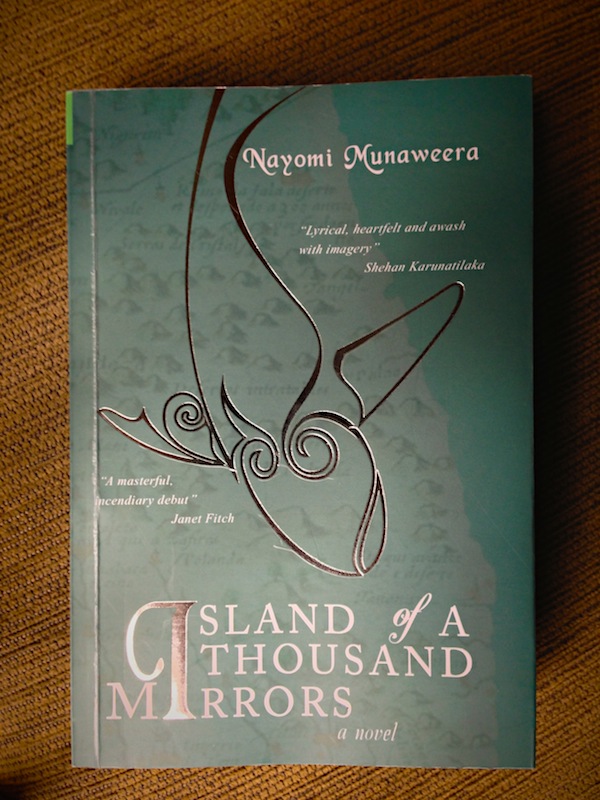The Los Angeles Review calls Nayomi Munaweera‘s first novel, Island of a Thousand Mirrors, “gripping, astonishing and utterly gorgeous”.
At the head of their lane, a buss on its knees, front tires exploded, haemorrhages thrusting, pushing passengers. At the far side, a particularly jovial mob gather. Reaching high above their heads the men pull a woman out of the small side window. They catch her sari pall, pull, jumping and climbing on each other’s shoulders. Mala has stopped in the street, turned to salt… She sees the woman’s open mouth, her arms flailing in this most exposed and air-bound uncertainty between the bus and the men. A long streak of red bisects her forehead, and then like a cork out of a bottle the woman is dislodged. She falls into the circle of men, streaming to earth, sari fluttering like a parachute. A roar of delight drowns the woman’s screams. The, again, the sound of gushing petrol. And finally Mala allows herself to be pulled away, down the street, into the quiet of the lane. Her red gate within sight. The scent is rising again, the thick fragrance of charred flesh like that which wafts from the Muslim quarter during Eid, the festive roasting of animal flesh.
The interview begins by asking Nayomi why she took such a long time – five years, starting after the 9/11 attacks in the US – to write the book. We then move to the very interesting story about the novel’s publication, a testimony to the power of the world’s leading web based social media network, Facebook. Given that the novel ends with the end of the war, Nayomi then answers why she revisited the ending a few years after she first wrote it, and before the novel’s publication.
The conversation then moves to how, in the novel, there is a tension between remembering and forgetting. The very last sentence of the book reads,
“The waves lick away her footsteps, the sand retaining no record of what came before her.”
The novel is prefaced with a quote from Milan Kundera, who avers,
“The struggle of man against power is the struggle of memory against forgetting.”
Nayomi goes into why this tension exists, and how it framed the writing of the novel. We then go on to why Nayomi feels uncomfortable, as an author, speaking about her own writing in public fora, when the process of writing itself is so private. Given the subject matter Island of a Thousand Mirrors deals with (akin to a novel like ‘Love Marriage‘ by V.V. Ganeshananthan), Nayomi is asked how she deals with people taking her fiction as a real historical account of Sri Lanka’s bloody post-1983 history.
Nayomi’s novel is negotiated through two female narrators – Yasodhara and Saraswati. In this interview she explains why it is important for her to tell stories from a feminist perspective.
After quoting from a particularly revealing passage from the novel on the politics of identity and the divide between the Sinhala and Tamil communities reflected in it, Nayomi goes into how she negotiated the politics of difference growing up, and worked it into Island of a Thousand Mirrors.
Nayomi novel, her first, was long-listed for the Man Asia Literary Prize 2012. In the interview, she is asked about what she felt when she discovered the novel hadn’t made it to the short-list. Given the publicity around the novel, and the rave reviews, Nayomi is asked whether she is now more anxious as an author in the throes of writing two other novels.
Having come last to Sri Lanka in 2004, Nayomi looks at how much the country has changed, and connects it to her engagement with the country growing up in the US, and the disconnect she also feels with Los Angeles. Towards the end of the interview, we also talk about Nayomi’s love of good Sri Lankan food (which is very evident in her novel), and what some of her favourite dishes are.

